Page one opened with “What the Honorable, The Secretary of the Interior says his Annual Report About Indian Education”, which included statistics on treaties made with the various tribes. Page two had a piece called “ Hindrances and Helps” as well as a piece on young women helping to raise money for the school. Page three had a small bit about…
Apache
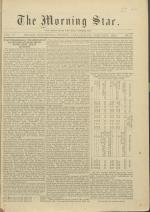
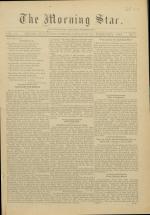
Page one opened with Proverb 11:23. Also on he page was “Educating The Indians”, and a Pueblo legend as told by a Pueblo student. Page two had story about a foolish farmer, as well as an important letter from an Indian Agent, and a piece on a conference at Lake Mohonk. Page three had the School Items which included Sunday services and the…
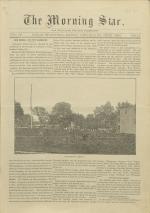
Page One had a photograph of the parade grounds on campus, as well as a bit of history on the Indian school. Page two had a small, horrifying piece on whether leaving Indians alone to die of illness or physically murdering them is more humane. The page also had extracts from the Address of Gen. George Crooks to the graduating class. Page three…
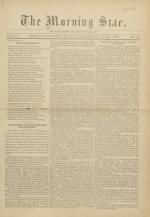
Page one had a poem titled “The Law of Liberty” followed by an article titled “The Republic in a Death Struggle with Ignorance” and comparison between the African and the Indian problem. Page two asked who was responsible for Indians having not fully “Christianized” and become “civil” and an article on the demoralizing old policy and how it has…
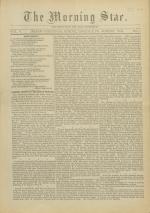
Page one opened with a poem on the Sioux, followed by a report on the “Present Aspects of the Indian Problem”. Page two asked “Who is responsible” for civilizing Indians as well as a small piece on an Australian who visited to learn about the Indians.
Page three had a continuation of the Australian visitor as well as several letters…
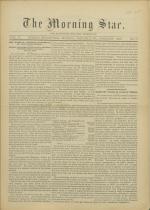
Page one opened with an extract from Hon. Byron M. Cutcheon speech, “Our Indian Policy,” originally given to the House of Representatives. Following that was “Secretary Teller in Favor of Schools.” Page two had a list of Bills and Resolutions relating to Indians that went before congress recently. Also on Page two was a letter from a Carlisle…
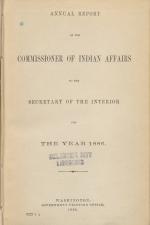
An excerpt from the Annual Report of the Commissioner of Indian Affairs to the Secretary of the Interior for the fiscal year ending 1886, containing the Seventh Annual Report of the Carlisle Indian Industrial School. The report, submitted by Superintendent Richard Henry Pratt, includes a school population table as well as discussions of…
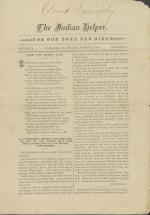
The first page opened with a poem titled “Take the Sunny Side,” by “Ex.” Also found on that page was “An Interesting Letter from John Dixon, One of Our Pueblo Boys Who Went to His Home in New Mexico Last Summer” addressed to Mr. Campbell. Dixon wrote about celebrating George Washington’s birthday, looking for railroad work and visiting the…
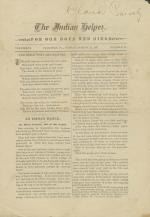
The first page opened with a poem titled “The Girls that are Wanted,” author unknown, followed by “An Indian Dance: By Dessie Prescott, One of Our Pupils.” Also on the page was an article about the importance for Americans to know their history. Page two opened with a treatise on patriotism, followed by a report by Joshua Given that the…
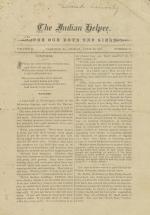
This issue opened with a poem titled “Kindness” followed by a reprint from the Word Carrier, “Manners” that compared ill-mannered behavior to animal traits and was intended as a lesson to Carlisle students. Also on that page was a paragraph reprinted from the Genoa Indian School describing a farming contest challenge between the Genoa…
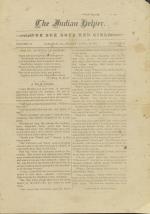
This issue opened with a poem titled “For Us, As Well as Others,” by Mary H. Krout, followed by “A True Story” shared by “Aunt Martha” about some mistaken identities among the Sioux and Pawness in Nebraska. The story continued on the fourth page. Page two included a reprint of Carlos Montezuma’s letter from Chicago dated April 24, 1887 titled “…
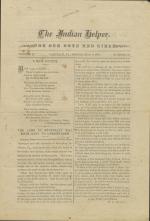
The Indian Helper opened with a poem titled “A New Citizen,” written by Elsie Fuller (Omaha) who was a student at Hampton Institute, reprinted from “Talks and Thoughts.” The next article was an explanation of the Dawes Act written by Sen. Henry Dawes and titled “THE LAND IN SEVERALTY BILL MADE EASY TO UNDERSTAND.” Page two was taken up…
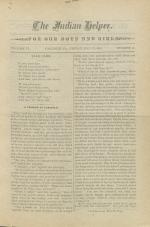
The first page opened with the poem "Take Care" followed by "A Visitor at Carlisle" which provided the opportunity to present arguments for Indian education away from the reservations. It continued on page four. Page two opened with an account of a presentation by "Dr. Harmon and Col. Thomas," a Dickinson College professor and his former…
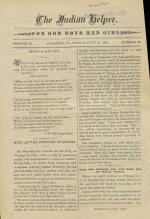
The first page opened with the poem "What a Jug Did," reprinted from An Old Scrap Book followed by a piece called "Nice Letter from Mr. Standing," made up of abstracts from his trip West returning Carlisle students to their home agencies. Standing mentioned there was a special travel car for girls and sick students, and described his…
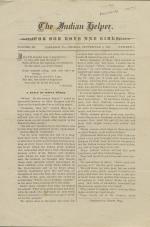
The first page opened with a short poem followed by a conversation continued from previous weeks between Marianna Burgess and the Man-on-the-band-stand describing her recruitment trip among the Rosebud and Pine Ridge Sioux. Page two reported contents of letters from student Josephine Bordeaux (Sioux), who had returned home and Jennie…
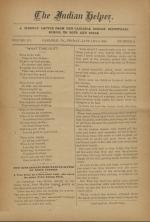
The first page opened with a poem, "What Time Is It?" followed by the story of Indian women whose harvested cache of vegetables had been stolen. The story was titled, "How Some Indians Were Made to Suffer by Their Enemies: A True Story by a Dear, Kind Lady Who Lived For Many Years Among Them." It was signed by A-TE-KA, aka "Aunt Martha," as…
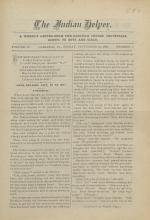
The first page opened with an untitled poem warning of the evils of debt, followed by “Eet, Kit-E-Ko Give It To Me: A True Story,” about fictional Aunt Martha’s exasperation after generously giving away all her potatoes to hungry Pawnee women. The story continued on page four. Page two featured news of returned students along with one-sentence…
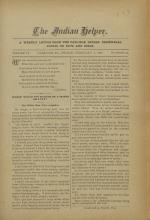
The first page began with an untitled poem that opened with the first line “We can never be too careful,” followed by “Which Would You Rather Be a Spider or a Fly? / The White Man Like a Spider,” an account of Mr. Seger’s description of the idiosyncrasies of language translation. It continued on the fourth page. Page two featured news articles…
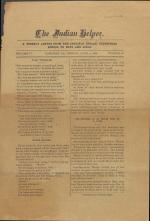
The first page began with a poem titled, “The Tongue,” followed by the Man-on-the-band-stand’s discussion in “Never Before,” that explained that a horde of boys would be marching east toward opportunity but a horde of boys would be marching west toward degradation, which he described as “evil practices and rot.” The page continued with “The…
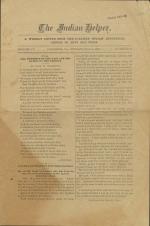
The first page began with a poem titled, “from The Memories of the Past and the Duties of the Present,” by John W. Woodside, followed by a reprint of a letter from former student Clarence Three Stars (Sioux) that reported conditions from his home titled “A Newsy Letter from Pine Ridge Agency: By an old Pupil of Carlisle who has been for Several…
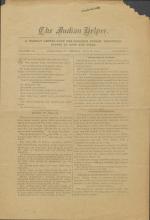
The first page began with an untitled poem with a first line of “God gave us hands – one left one right,” followed by an article describing the seeds of success titled “When It Tells.” The next article was about the Ayan Indians who fish salmon on the Yukon River titled “Sharp-sighted Indians,” followed by a treatise on politeness. Page two…
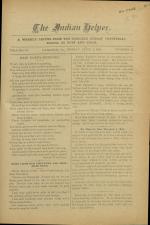
The first page opened with a poem by Susan Coolidge titled “New Every Morning,” followed by a letter from Ernie Black (Cheyenne) titled “News from our Cheyenne and Arapahoe Boys.” Also on the page was a reprint from The Sunday School Times titled “We Must Be Run Through a Mill.” Page two opened with a quote from Paul Boynton (Arapho)…
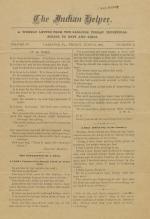
The first page opened with a poem by Fannie Bolton titled “It is Time,” followed by “The Experience of a Bull: A Child’s Version of the Recent Flood at Lewistown,” followed by “A Busy Indian Boy in the Country” which was Wallace Scott’s (Pueblo) description of his farm experience in Bucks County. Page two featured a notice of the new premium…
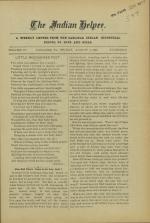
The first page opened with a poem “Little Moccasined Feet,” followed by the article titled “How Did There Come to be Any Coal?” that described the origin of coal. Page two opened with “Small Beginnings,” a litany of how Benjamin Franklin, Columbus, and others had their origins. “How One Conquers,” followed by “Luck and Labor,” as well as…

The first page opened with a poem “Your Mission: Remarks Made at our last Sunday Evening's Service, by an Indian Boy, as Reported by E. Grinnell." followed by the sixth installment of the series titled “How An Indian Girl Might Tell Her Own Story if She Had the Chance: Founded on Actual Observations of the Man-on-the-band-stand’s Chief Clerk” (…
